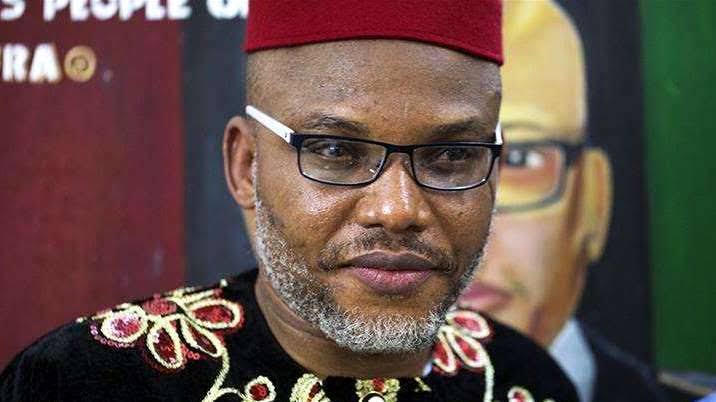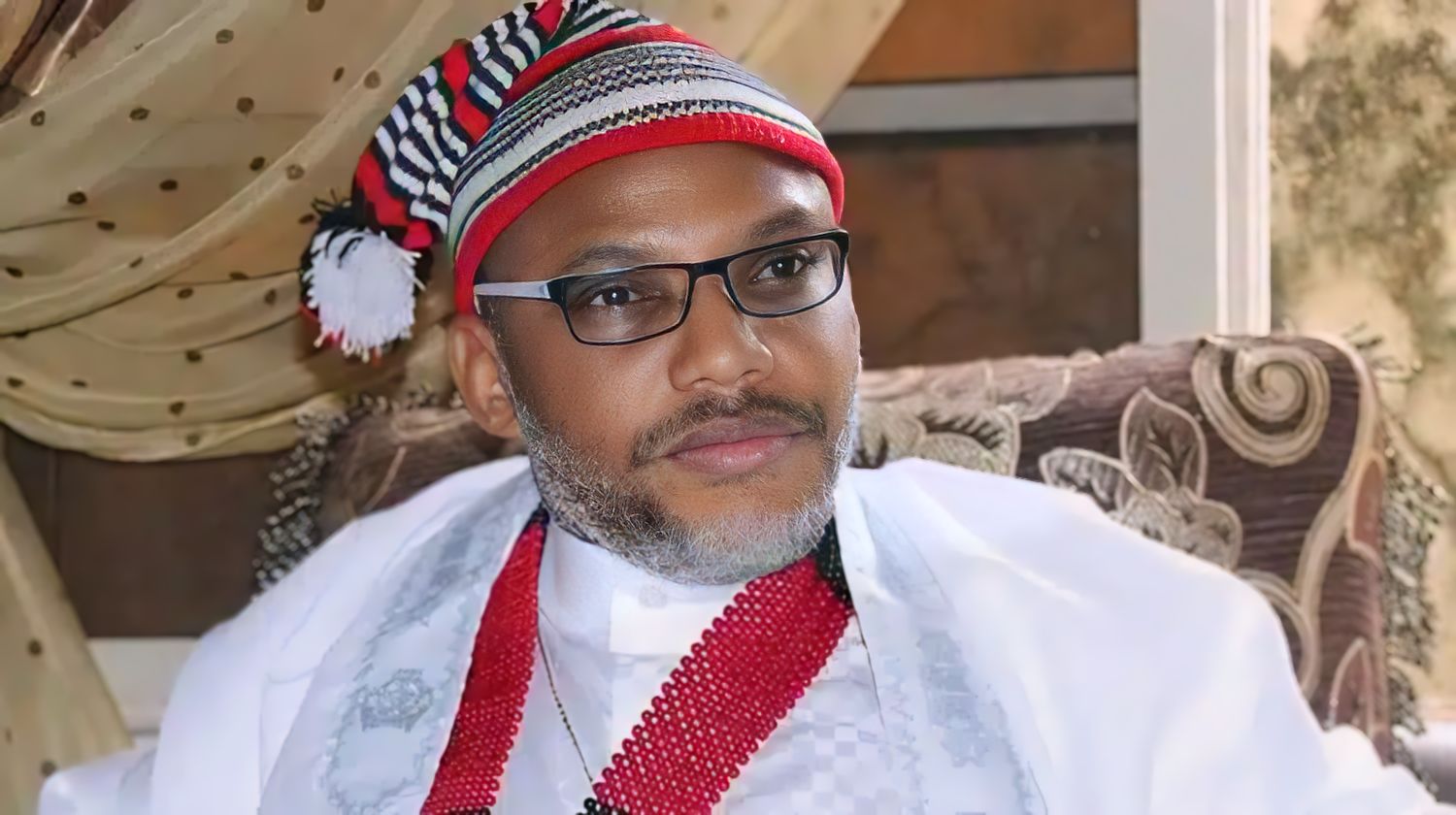Amid the dazzling interplay of Nigeria’s political dynamics, Nnamdi Kanu stands out as an arresting silhouette. Polarizing yet pivotal, the narrative surrounding his incarceration resonates not only within Nigeria’s shores but also reverberates internationally. He’s not merely a figure; he embodies the aspirations and frustrations of the southeast, a region that has long sought a louder voice on Nigeria’s national stage. As the leader of the Indigenous People of Biafra (IPOB), Kanu champions the cause of those who feel sidelined and underrepresented.
Nnamdi Kanu has persistently grabbed headlines, but as of now, he is on the precipice of what could be a defining moment in his tumultuous journey. The Supreme Court judgment scheduled for December 15, 2023, where his legal team has launched dual appeals, is of monumental significance. One challenges the very manner in which he was extradited from Kenya to Nigeria, asserting it as a breach of international law. The other contends the legitimacy of his continued detention by the Nigerian government, highlighting potential constitutional infringements.
If the scales of justice tilt in favor of Kanu, the implications are multifold. For him and the legion of his supporters, it would symbolize a triumph of justice, a vindication of their prolonged struggle against what they perceive as state overreach. For the Bola Ahmed Tinubu administration, keen on establishing its mettle and legacy in Nigeria’s political landscape, Kanu’s release could be a seminal juncture. It presents a conundrum: how to balance national security concerns with the imperatives of justice and human rights.
The international ramifications are equally significant. The Nigerian government has, in its efforts to quell the IPOB movement, faced strident criticisms. Accusations of human rights abuses have put Nigeria under a global spotlight, with international agencies and foreign governments closely monitoring the situation. A ruling in Kanu’s favor could augment these criticisms, challenging the government’s narrative and its handling of the IPOB situation.
Furthermore, for Bola Ahmed Tinubu’s administration, a decision on Kanu is more than just about the fate of one individual. It’s about setting a tone for governance, about signaling whether the administration leans towards an inclusive, justice-oriented approach or whether it opts for a more hardline stance. In many ways, the Kanu situation serves as a litmus test for the administration’s broader commitment to human rights, judicial independence, and democratic values.
The Southeast’s Quest for Acknowledgment
Nigeria, a mosaic of cultures, languages, and histories, has often found itself grappling with the complexities of its own diversity. At the heart of this nation’s saga lies the intricacies between its various ethnic and regional factions. Bola Ahmed Tinubu, a political maestro with an illustrious career spanning decade, is no stranger to these dynamics. As a stalwart of Nigeria’s political class, he has navigated the ebb and flow of power politics, witnessing first-hand the dominant roles from the west and north have historically played. Conversely, the southeast, a vibrant and crucial part of the Nigerian story, has frequently felt overshadowed, its voices muffled, and aspirations curtailed.
Nnamdi Kanu, a figure of intense debate and fervor, is emblematic of the southeast’s quest for acknowledgment and equity. The leader of the Indigenous People of Biafra (IPOB) isn’t merely an individual but a symbol, representing the simmering discontent and feelings of marginalization prevalent among many in the southeast. These sentiments stem from perceptions, not entirely unfounded, of an uneven distribution of power and resources, favoring the traditional political powerhouses at the expense of others.
Thus, the discussion surrounding Kanu’s release transcends the man himself. It is a matter of profound national significance, touching the very core of Nigeria’s aspirations as a united, harmonious federation. By releasing Kanu, the Tinubu administration would be extending an olive branch not just to one man but to an entire region. It would be a tacit acknowledgment of past oversights and an overt gesture of reconciliation.
Such a move would have multifaceted implications. Firstly, it would signal a genuine recognition of the grievances of the southeast, acknowledging their rightful place in the Nigerian narrative. More importantly, it would be a monumental step towards healing age-old wounds, mending fractured relationships, and fostering a sense of belonging among those who have long felt disenfranchised.
The Broader Context of Nation-Building
In the broader context of nation-building, Tinubu’s administration stands at a crucial juncture. The decision concerning Kanu offers an opportunity to redefine Nigeria’s future, pivoting away from entrenched divides towards a more inclusive and harmonious national identity. By championing the cause of unity, integration, and true federalism, the administration could etch its name in the annals of Nigerian history as one that bravely confronted past missteps and actively sought to forge a united path forward. The ethos of a nation is often determined by its actions in moments of profound decision.
Read also: The Imperative For Global Action: The Case Of Nnamdi Kanu
Upholding the Cornerstones of Democracy
In the theatre of global politics, Nigeria’s democratic narrative is keenly observed, dissected, and often serves as a barometer for the entire West African region. Central to this discourse is the arrest and ongoing detention of Nnamdi Kanu, a development that has stirred global consternation and intense domestic debate. His situation has become emblematic of larger concerns surrounding human rights, freedom of expression, and the sanctity of democratic principles.
The international community, ever vigilant, has expressed its reservations. Organizations with considerable gravitas, such as Amnesty International, have voiced apprehensions about the transparency and legitimacy of Kanu’s detention. Their involvement accentuates the global significance of this issue, underscoring that Nigeria’s actions in this matter resonate far beyond its borders.
The era of globalization imposes a dual responsibility upon nations. As Nigeria aspires to be a shining exemplar of democracy in West Africa, it must not only champion the rights and freedoms of its citizens domestically but also recognize that its conduct is a testament to its democratic credentials on the world stage. The Tinubu administration, at the helm of this national narrative, faces the weighty task of ensuring that its actions mirror the democratic ideals it purports to uphold. Releasing Nnamdi Kanu would not just be a domestic decision; it would echo internationally as a powerful affirmation of Nigeria’s dedication to the tenets of democracy.
Nnamdi Kanu: A Symbol of Resistance and Hope
The case of Nnamdi Kanu is not merely a matter of legal concern but a litmus test for Nigeria’s commitment to human rights, due process, and democratic ideals. It brings to the fore pressing questions about the lengths to which a government can go in suppressing dissent and the role of the international community in safeguarding individual freedoms against state overreach. Kanu’s sudden abduction from Kenyan soil and subsequent detention by Nigerian authorities under charges of terrorism and treasonable felony ignited a firestorm of criticism, raising alarms over the legality of such extradition methods and the potential violations of international law.
As the leader of IPOB, a group labeled as a terrorist organization by the Nigerian government but seen by many as a legitimate movement for self-determination, Kanu represents a voice for millions who feel disenfranchised and silenced within their own country. The backlash following his arrest underscores the deep divisions and unresolved tensions that plague Nigeria, a nation still grappling with the scars of colonialism, ethnic strife, and the struggle for equitable resource distribution.
The international outcry for Kanu’s release underscores a broader narrative of resistance against injustice and the suppression of dissenting voices in an increasingly interconnected world. Human rights organizations, international legal bodies, and advocates of democracy worldwide have rallied behind Kanu, viewing his detention as emblematic of the challenges faced by political activists and freedom fighters globally. This collective demand for justice transcends geographical boundaries, uniting diverse voices in a chorus calling for transparency, fairness, and the upholding of international norms.
Conclusion: Nigeria at a Crucial Juncture
Nigeria, a country brimming with promise and potential, finds itself at a pivotal point in its history. The decision concerning Nnamdi Kanu’s detention transcends mere legalities and politics; it represents a critical moment that will reflect the nation’s dedication to democracy, human rights, and adherence to the rule of law. The international community watches closely as Nigeria navigates this intricate situation, with outcomes that could either enhance its democratic image or deepen skepticism about its governance.
The release of Nnamdi Kanu is long overdue. His continued detention underscores a reluctance to embrace the principles of justice and equity that are fundamental to a thriving democracy. Releasing him would send a strong message of Nigeria’s commitment to unity, justice, and democratic values. It would be a significant gesture towards a marginalized region, a symbol of hope for the disenfranchised, and evidence of the nation’s dedication to inclusivity and reconciliation.
Africa Digital News, New York, once again calls on the Nigerian government to do the needful by releasing Nnamdi Kanu with immediate effect. This action would not only rectify a grave injustice but also demonstrate Nigeria’s resolve to uphold human rights and democratic integrity.
The decisions made in this period will shape Nigeria’s legacy and its future standing on the global stage. As history looks on, Nigeria’s actions will chart its course forward and define its place in the world. It is a moment for Nigeria to reaffirm its commitment to the rule of law and the democratic ideals that form the bedrock of a just society.










